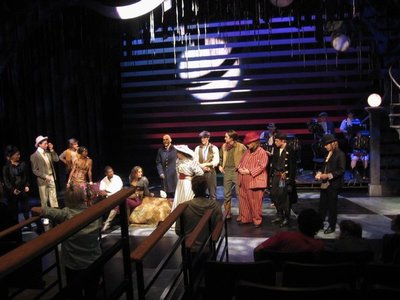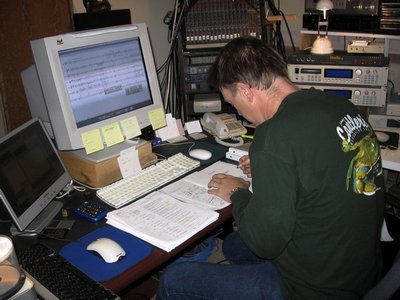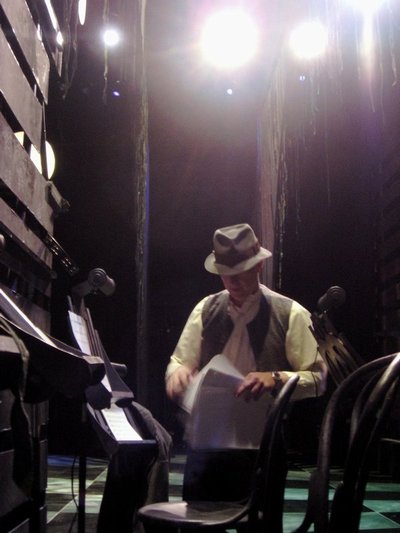October 23, 2008
Music student jazzes up New Orleans-style ‘Twelfth Night’
The week before the opening of Twelfth Night, the Meany Studio Theatre is abuzz with the frenetic energy of a rehearsal. Composer Doug Niemela, sporting a herringbone vest and fedora, organizes a handful of sheet music and confers with musicians who are also decked out in turn-of-the-century newsboy caps and breeches. Actors pace across the stage, practicing songs and juggling acts, but the musicians are just as much a part of the show in this production. Rather than being hidden in an orchestra pit, Niemela and the ensemble appear onstage in the New Orleans-themed show — hence the costumes.
The show is the UW School of Drama’s production of Shakespeare’s comedy, and Niemela, a doctoral student in music composition who studies with music professor Richard Karpen, has created an original score for it, adding plenty of Southern flavor with jazz, R&B and Cajun-style tunes. Director Richard E.T. White chose the New Orleans concept to emphasize the play’s themes of deceit and mistaken identity, using props like Mardi Gras masks to mirror the characters’ deceptive actions, Niemela said. White also wanted Niemela’s music to become part of the drama.
“There are moments when the musicians become actors and the actors are musicians,” Niemela said. “I have certain members of the cast actually come over and play in the band, and I have some of the players in the band … walking around and involved in straight-up drama. [White] blurred the line — he really wanted to mix the two at moments so there wasn’t a clean, dividing line between drama and music.”
Niemela recruited the eight-piece band, which is almost entirely made up of UW undergraduate and graduate students. Brass instrumentalists, a violinist and an accordion-player — the only musician not affiliated with the UW — are a constant presence in the show, performing the 34 musical cues Niemela wrote.
One of his early challenges was creating jazz and blues music to fit Shakespearean language, as all the song lyrics in the production use Shakespeare’s original words.
“I started out very conservative,” Niemela explained. “My melodies were kind of Elizabethan and [White] would be like, ‘Doug, you’ve got to break free. The only rule is that you can’t change words.'” White gave him the freedom to start writing music that was unique to the production, he said.
Not that it was an easy process. Niemela spent about four months writing and rewriting music in his studio north of campus.
“I read books on the music of Louisiana. At the same time I was studying the play,” he explained. “With those two things, I began to understand the characters and started working on stuff for the show.”
With Shakespeare’s words as his starting point, he experimented with tunes on a piano and sang to himself, sketching notes and eventually creating scores on his computer. Niemela mostly heard the music in his head before it came to life with help from the actors and the band.
“The funny thing is that you work in silence when you do this; your imagination is the best tool,” he said at his studio. “You go from sitting weeks alone here — I spent many days, eight to 10 hours, sitting here — and it’s pretty quiet. The payoff that I love is when I go [to UW] and then all of the sudden I have these great people. We all come together and it’s so fun.”
So what does Shakespeare sound like when paired with Cajun-style music? You can listen to a rehearsal of the opening song, Careless Love, by clicking the link at right. Performed by Hannah Franklin as Mademoiselle Fabienne (Fabian in the original play), Careless Love is a jazz standard requested by White and the show’s only unoriginal song; the arrangement, however, is Niemela’s.
Niemela said the actors have worked hard to perfect the art of performing Shakespearean dialogue and lyrics in a 1900-era New Orleans dialect.
“I was amazed that Richard [White] could do that,” he said.
White used Shakespeare’s old language, “but it has a twang to it; it has a cadence that’s New Orleans,” Niemela said. “It’s an Americanized version of Twelfth Night. New Orleans is one of the oldest cities and so there’s a lot of culture that [White] is keying in on, which I think is really fascinating. It’s a great tribute to a city that’s having a hard time right now.”
The experience is a new one for Niemela, who has never composed music for a full-length live production. He learned about the opportunity last spring from an e-mail White sent in search of a creative team, and he impressed the director with samples of jazz and big band music on his Web site.
Niemela said he enjoyed working with live theater, which was a drastic but welcome change from his quiet studio. In addition to composing, he hopes to be creatively involved with other aspects of productions in the future.
“My interest is working with lighting designers and stage designers — just the big spectacle,” he said.
Niemela credits White, who is chair of the theater department at Cornish College of the Arts and has directed at several regional theaters throughout the U.S., for giving him the opportunity to have creative freedom in composing Twelfth Night’s music, recruiting the band and coaching the actors’ singing.
“I remember I said, ‘Look, you know I’ve never done this before,’ so he had to take a chance. I’m trying to return the favor — make it worth his while, make it worth his time.”
Twelfth Night runs Oct. 26 – Nov. 9. Previews are at 7:30 p.m. Oct. 26 and 28. Previews for everyone are $8; all other performances: UW employees, $13; adults, $15; seniors, $12; and any student, $10. Group discounts are available. Reservations/info at the UW Arts Ticket Office, 4001 University Way NE, (206) 543-4880 and at www.drama.washington.edu.



